|
Homeward sounds Picking the best locally made records of 1998 was easy. Who knew? By Robert Wilonsky
In the Letters section of this week's Dallas Observer appears a missive from Jim "Reverend Horton Heat" Heath, blasting me for hinting in a recent Street Beat item that Reverend Horton Heat was recently dropped from Interscope Records because the label was unhappy with quality and quantities moved. Heath demanded to know why he wasn't contacted "to get the real story"; he refers to the article as one full of "falsities and insults." The question is fair enough, though I thought I had already read the "real story" in The Dallas Morning News something about a "mutual decision" to part ways. That was the official word.
Heath, for his part, does not offer the "real story" in his letter, only a blanket condemnation of myself, this newspaper's music section, and our treatment of the so-called "Dallas music scene" of which Heath has long been a part. I made no secret of my dislike for Reverend Horton Heat's 1998 CD Space Heater, by far the most disappointing of the band's handful of albums. Most recently, I referred to it as space filler, prompting Heath to write that "if Robert could write at least one song as good as any of the songs on Space Heater, he could have his own silly band." Thanks, Jim, but no never said I could write a good song, never wanted to, never tried.
Heath, on the other hand, has written some pretty amazing songs: "I'm Mad," "400 Bucks," "Psychobilly Freakout," "Love Whip," "Lonesome Train Whistle," to name but a few. He's made one of the best records ever to bear the name of a Dallas band: The Full-Custom Gospel Sounds of The Reverend Horton Heat, released in 1993. He had been signed to Sub Pop, made the leap to a major, and remained a constant fixture around Deep Ellum. No one has ever accused him of not being the "local guy," as he puts it in his letter. Hell, the man's the very definition of homeboy.
What bothers me most about his letter is his assertion that by condemning rather than celebrating his latest release, I am "[destroying] a good local music scene." It's the same-old-same-old denunciation whipped out any time someone in this newspaper decides he or she doesn't like a record made by someone who lives in Dallas or Denton or Fort Worth: You guys just like to destroy the scene. It's the rallying cry of those who think writers exist to blindly celebrate anything released with a made-in-Dallas stamp on its back. It's the sound apologists make when they cock their pistols and shoot the messenger instead of listening to the message. And besides, local journalists do not make or break careers, as Jackopierce or Deep Blue Something will gladly tell you. Bands are subjected to the whims of the buying public, not the tastes of critics. If that were the case, Bedhead and Funland would have been more famous than God, and the boys in Deep Blue Something would have to get real jobs.
Heath (whose band is now signed to Time Bomb Recordings) shouldn't have to defend the record he and his band made, but why must a discussion about his record suddenly be turned into a defense of an entire "scene" that doesn't exist now and hasn't since the late 1980s, if even then? Deep Ellum is a scene? Hardly more like a giant theme park owned by a handful of men who book the bands signed to the label owned by the guy who's in business with the dude who manufactures the records of the guys they book in their clubs...and so on. This inclination to perpetuate talk of a scene is silly, pointless, and ultimately detrimental. It posits "enemy" against "enemy" until it's Us Versus Them, which it hasn't been ever since Club Clearview started serving food.
It's funny, actually: I can't remember a year when so many local bands released so many albums that I'll play well into next year and beyond and there ain't a single one of them by Café Noir or Little Jack Melody and His Young Turks (no releases in 1998). And only one of the 20 discs on the following best-of list (which appears in alphabetical order) was released by a major label, which only makes me wonder what Jim Heath means when he writes: "I long for the good old days when Observer music writers were on the side of local artists instead of the big-business types at major labels." Actually, two of the most disappointing records of the year by local bands were released on majors: Space Heater on Interscope, and the Dixie Chicks' sellout move Wide Open Spaces. Those Observer Music Awards can be rescinded at any time, incidentally; didn't you get the notice?
Hell, at least one of these records is so homemade it tastes like apple pie fresh from the oven: Until last month, Reed Easterwood was just giving away copies of Absolute Blue; might as well hand out gold coins. The Homer Henderson-Nick Tosches collaboration remains in, shall we say, "limited release" until early 1999. And most of the others on our list were released on labels so small the advances were paid in lint and a smile. Which means the likes of Peter Schmidt, the Dooms U.K., James "Big Bucks" Burnett and his Volares, Fury III, the Calways, Cowboys and Indians, Ronnie Dawson, Go Metric USA, Spyche, Jeff Liles (since dropped from Virgin Records and now the co-founder of his own brave label, HEIRESS aesthetic), and the rest of the best this town has to offer receive as much recognition as a shadow in the dark. They have no publicist pushing their records to the media, no college-rock department trying to get their discs on radio, no budget to tour with White Zombie. They save their money, make records for pennies instead of thousands, then trudge off to their day jobs, hoping only that some schmuck will dig their record out of a pile, play it, like it, even hate it, then maybe give it some cheap ink or airplay. All things being equal, Peter Schmidt's Love or the Decimal Equivalent shoulda been a hit sold millions, or at least hundreds.
I'm hard pressed to find a local (or otherwise, what the hell?) record made in 1998 that provides more pure pop pleasures than Jesus Hits Like the Atom Bomb, which proved to be Tripping Daisy's final album for Island Records and by far the band's best, after years of making albums I found too unbearable, too inane. Like the Rev, the Daisy too finds itself without a major label at year's end for similar reasons; this Jesus got more returns than the real thing. But the Daisy parted ways with Island on its own terms: The band knew it was asking for trouble by demanding the release of a six-minute single, even though Jesus is crammed with short, sharp radio-ready gems easily digested by programming directors begging for one more disposable hit. "Mechanical Breakdown" should have been heard on radio all summer long; "Sonic Bloom" or "Field Day Jitters" would have made logical successors. But instead, the band chose "Waited a Light Year"; it didn't take that long for Island to dig up the Daisy and dump it in the compost heap. Perhaps it's for the best: When left to its own devices, without label bosses or A&R buffoons looking over the band's shoulders, Tripping Daisy makes the album of its (or the Flaming Lips') career. At least Tim DeLaughter and Julie Miller ended the year on the most optimistic of notes, having given birth to their first child. As my people say, mazel tov on the kid, and on being off Island.
See, major labels can screw you up, make you lose sight of everything you ever struggled for, use you like a whore, then sell you for parts when they're done with you. How else to explain the comments made by Dixie Chick Emily Erwin in the most recent issue of Entertainment Weekly? When talking about the band's three self-produced and locally released albums prior to this year's Sony Music bow Wide Open Spaces which garnered the band two awards at this year's Country Music Association awards show, including one for best newcomers (harharhar) Erwin said she hopes the collection "never surfaces [because] they don't have that pure Dixie Chicks sound." Never have I seen a band so willing to forget its past, so willing to cut loose those that brung 'em, in its rush toward the vault before the doors slam shut. Suddenly, a band once steeped in tradition, owing its everything to Bill Monroe and the Andrews Sisters and Dolly-Emmylou (not to mention founding members Robin Macy and Laura Lynch, excised from mind and bio), has become nothing simply one more disposable part of Nashville's Music Row machinery that grinds the humanity out of even the best-intentioned. Erwin and sister Martie Seidel can no longer disavow themselves from those old records than they can their new Music Ho fashions (again, see the new Entertainment Weekly). Sometimes I think the Spice Girls have more dignity.
Ah, but why belabor the point when there's so much better out there? Or out here, as the case may be. It says something that when Zac Crain and I were trying to put together a local worst-of list we came up with a mere five, and it was a struggle at that, while this best-of collection came to us in a matter of three or four minutes. By the way, we decided not to run our worst-of list. We're funny that way.
It will be interesting to see how the Universal Music Group purchase of PolyGram and the subsequent reshuffling at Interscope, Geffen, Mercury, and other affiliated labels will affect the Dallas-Denton-etc. bands signed to them. Will the tomorrowpeople's record get released in the spring, as Geffen hopes, or will it disappear in the discarded heap that is quickly becoming the music business? Will the Toadies still have a home at Interscope? And what will become of little Ben Kweller and Radish? Time, as they say... Maybe that means John Freeman and the Legendary Fritz and Spyche and Jeff "cottonmouth, tx" Liles and Easterwood are just luckier, better off after all. They don't need anyone to validate their music, their "scene." They're just trying to make the rent and the rock. Bless them if they can do both.
The Calways, Starting at the End
Who knew Todd Deatherage's scruffy rockabilly trio of two years ago could make a big rock-and-roll record like this? Probably no one, because even the band didn't. Starting at the End shows off the band's new five-piece lineup, and it makes all the difference in the world, filling in the blanks the band's previous work seemed to be so full of. There's more there there now, as Marc Daigle's guitar and Mike "Cruiser" Smith's keyboards create a sound thicker than a pint a Guinness, and every bit as intoxicating. Cutting their twang with new wave keyboards and jagged guitars, Deatherage and The Calways produce songs as sloppy and urgent as a goodbye kiss, and just as thrilling. Here's where people stop measuring the band against the Old 97's and start comparing it to Slobberbone. It's still not accurate, but at least it's getting closer.
Zac Crain
Cowboys and Indians, Big Night in Cowtown
Most swing revivalists jump their jive with slick style but nary a drop of heartfelt substance; the whole lot of voodoo daddies out there couldn't swing if you hung 'em from a rope. Which makes Cowboys and Indians a precious commodity indeed: Erik Swanson, Billy King, and the rest of their posse aren't only Bob Wills scholars and Louis Jordan fetishists, but they're also top-notch musicians whose love for Western swing shines through like a spotlight at midnight. Their talent transcends their blues-to-bop tastes, meaning their originals sound like covers (cf. "Red Hot Rhythm," "Blues in My Coffee"), their covers sound brand-new (Bob Wills' "Drunkard's Blues"), and the result defines what it means to be "timeless."
Robert Wilonsky
(Requires RealPlayer)
Ronnie Dawson, Live at the Continental Club
Every studio record this rockabilly hero makes is, more or less, live: recorded in a single take on equipment that hasn't been modern since the Edsel fell off the assembly line. But this in-concert throwdown, a 21-song best-of recorded over two glorious nights last January at Austin's Continental Club, is especially remarkable, because it's the first and last record to feature Dawson and his since-disbanded backup band that featured Tjarko Jeen on guitar, Kevin Smith on bass, and Lisa Pankratz on drums. That band could have lit a campfire without a match, and only the youngest "old" man alive could have kept pace. Does the once-and-future Blond Bomber ever make a bad record? Not even possible.
R.W.
Kevin Deal, Lovin' Shootin' Cryin' and Dyin'
Kevin Deal came out of nowhere well, Plano armed with a crack band of hired hands to deliver an album Johnny Cash might have made in the '50s if he'd been backed by The Band instead of the Tennessee Two. Over accordions, washboards, mandolins, and dobros, Deal sings of dead men and deader love, and both are equally chilling, even when delivered in Mick Jagger's voice. It's a rare country record set in the country, telling backwoods tales of broken relationships and broken-down men, gunslingers who want one more chance, and bitter men who'll never get another one. Let's hope Deal isn't one of them.
Z.C.
(Requires RealPlayer)
The Dooms U.K., Art Rock Explosion!
Full of Spanish vocals, big rock moves, turntable scratching, keyboard fills and thrills...and that's just the first song. The Dooms U.K. continues to be the most confounding and astounding collective around, trying its hand at everything and then some, just because no one has told them they can't; Art Rock Explosion! contains more musical genres than most record stores. The band's second album was a long time coming, recorded in bits and pieces over four years. But it might as well have been recorded next year, because no one else has caught up with the Dooms yet, and maybe no one ever will. Proof enough John Freeman and friends are more than the joke you think they are.
Z.C.
(Requires RealPlayer)
Legendary Crystal Chandelier, Love or the Decimal Equivalent
Peter Schmidt's "debut" is one of the few local records that doesn't need to be graded on a curve; it would be near the top of this year's class no matter where it was released. Every song is a quiet, beautiful treasure, whether Schmidt is trying on Joe Jackson's dancing shoes or re-imagining Cole Porter songs as woozy trip-hop. The guitars are turned down if not entirely absent letting Schmidt's vocals shoulder almost the entire load. And that's really the most surprising thing about Love or the Decimal Equivalent: After years of being obscured by Funland and Three on a Hill's raucous riffing, Schmidt is revealed to be one of the finest vocalists this city has ever produced. Six months after it was released, hearing him sing "Well I Know" backed only by the sparest of keyboard arrangements still brings tears to my eyes.
-- Z.C.
Kim Lenz and her Jaguars, Kim Lenz and her Jaguars
Production quality on this debut is total shit, which is precisely what Lenz and producer Wally Hersom were going for. They call it "authenticity," which is just another way of saying it sounds like something bought at a yard sale...in 1958. But Lenz's charm and chops put the whole thing over until you realize her bad-girl rockabilly-queen schtick is her entire reason for being; this "Kiss and Tell Baby" is no more a novelty act than Ronnie Dawson was four decades ago. Sometimes a girl just wants to be Wanda Jackson, and there ain't nothing wrong with that.
R.W.
(Requires RealPlayer)
The title hints at swing, and not Western neither; I'm leery of anything that says cocktail unless it comes with one. But this debut by this band of vets (among them Enablers-etc. bassist Bart Chaney and Liberty Valence guitarist Kim Herriage) and "newcomer" Michele Pittenger on vocals is more country than lounge. Or countrypolitan, as the case may be: This is what honky-tonk sounds like when it gets dressed up for a night on the town. It might get slick, but it never quite loses the twang. What Loretta Lynn might have sounded like if she fronted the Crickets.
R.W.
Spyche, So Blue You Shimmer
Never could figure out what she was doing in Darlington; after all, Spyche only looks punk, but beneath the denim-and-biker-boots exterior, she's marshmellow soft. Once a very long time ago, she was the heartbeat in Rumble, playing bass and whipping out a tear-dropping version of Prince's "The Beautiful Ones" until it seemed as though that was the only song the band played that night; and her Heaven on a Stick version of Cheap Trick's "The Flame" managed to turn syrup into wine. That her first solo record should be so fragile, lovely, even tentative and sad is hardly a surprise woman's got more heart than a Harlequin paperback. "When I'm blue," she sings over and over again, till her heartbreak becomes yours. Spyche can't tell hope from despair, until finally the record becomes hard to listen to but only because you know just what she's talking about.
R.W.
Sub Oslo, Sub Oslo
There are only three actual songs on Sub Oslo's self-titled EP, but it seems as if there are dozens, as each track sounds as though it's being remixed every minute or so. Dub mixer Joe Nuckels adds more effects than the Star Wars: The Phantom Menace trailer, and Miguel Veliz's bass is so heavy, he probably threw his back out in the studio. It's like spending a drunken evening in the back of a reggae club, as everything blurs together until it becomes one continuous and, at times unsettling memory. Dub music rarely sounds this good. I don't think I can stress that enough.
Z.C.
Nick Tosches and Homer Henderson, Nick & Homer
Absolute weirdness, though you'd expect nothing less from Tosches (the man who went looking for the devil in Jerry Lee Lewis and found only Jerry Lee) and Henderson (you mean Lee Harvey wasn't a friend of his?). And absolute genius too: ? and the Mysterians backing Jimmy Reed while the "Pizza Man" holds a gun to everyone's head, especially his own. An excellent companion to Henderson's best-of Greatest Flops and Golden Filler, also released at year's end. The very definition of local hero, which is a damned shame.
R.W.
(Requires RealPlayer)
Transona Five, Duffel Bag
Trading in subtly intricate songs in North Texas is bound to result in two things: apathy and Bedhead comparisons. With its delicately intertwining guitars and painstaking melodies, Transona Five's first long-player could have should have been dismissed as barely reheated leftovers from WhatFunLifeWas. But just when you think you have all of the band's pitches timed, they strike you out looking with pop curveballs (the "Porquoi Manges-Tu?"), acoustic changeups ("3 Way Glider"), and even the occasional fastball (the surprisingly rocking "Estrogen Blaster"). It's the sound of a great record collection becoming a good band.
-- Z.C.
Tripping Daisy, Jesus Hits Like the Atom Bomb
Just when these boys make a great album accessible but not sell-out, Pop but not pop, catchy but not in a "I Got a Girl" kind of way they sabotage its success by picking a radio-unfriendly single and a title only a Jew could love. What? They didn't want anyone to hear how, like, good they got? Guess not, and too bad, since Jesus gets better every time you listen to it: The guitars grow louder, the drums pop harder, Tim DeLaughter sounds more like a human and less like a Sid and Marty Kroft creation, and every now and then, the lyrics make a little
(Requires RealPlayer)
R.W.
Various Artists, Down By Sound: KNON Hip-Hop Compilation
(Requires RealPlayer)
More than anything, Down By Sound is proof that an active hip-hop scene can exist without the support of clubs or radio airplay. Compiled by KNON-FM's DJ EZ Eddie D, it features a grab bag of styles from East Coast jazzmatazz (Poppi Lo's "First Down," Soule's "Maintain," Native Poet's "Going For Broke") to funkadelic West Coast grooves (Ghetto Fame-Us' "Bring It Live," Kinfolk's "All MC's," Mouth of Madness' "Make It Hot") to spooky hip-hoperas (Judas Cradle's "Lust, Love and Lechery," Gigsaw's "Linguistic Class #2"), and sometimes a little bit of everything (Shabazz 3's East-meets-West "Latitude/Longitude"). Dallas hip-hop may be more underground than a subway in Hell, but this album is a small step toward changing that. For that reason alone, it's the best local album of the year.
-- Z.C.
The Volares, The Night We Taught Ourselves to Sing
Only James "Big Bucks" Burnett could dedicate a song to The Faces' Ronnie Lane, thank Jimmy Page in the liner notes, and not have both gestures come off as wishful thinking. And only Burnett could make an album like this, a completely irony-free take on 1960s and '70s rock. The disc sounds like what you'd expect from the man who used to hawk eight-track tapes at his 14 Records shop on Greenville: Burnett never knew there was a present or a future, for that matter to escape to, so he recreates the past with a fetishist's fervor. With former Trio of One frontman Paul Averitt and Dare Mason along for the ride as well as more guest stars than a Love Boat rerun The Night We Taught Ourselves to Sing echoes with more ghosts than a haunted house. Even though Burnett knows his history, he's more than happy to repeat it.
|
| Russian Language |
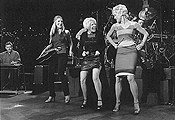 We have copies of the Dixie Chicks' first three records. Wanna hear 'em?
We have copies of the Dixie Chicks' first three records. Wanna hear 'em?
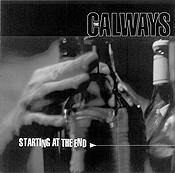
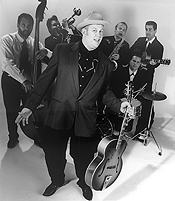 It don't mean a thing if ain't got that Cowboys and Indians swing.
It don't mean a thing if ain't got that Cowboys and Indians swing.
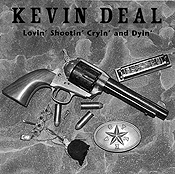
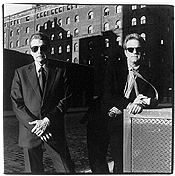 Blues brothers: Nick Tosches and Homer Henderson
Blues brothers: Nick Tosches and Homer Henderson Tripping Daisy released the best album of its career then got dropped from Island Records as its reward.
Tripping Daisy released the best album of its career then got dropped from Island Records as its reward.